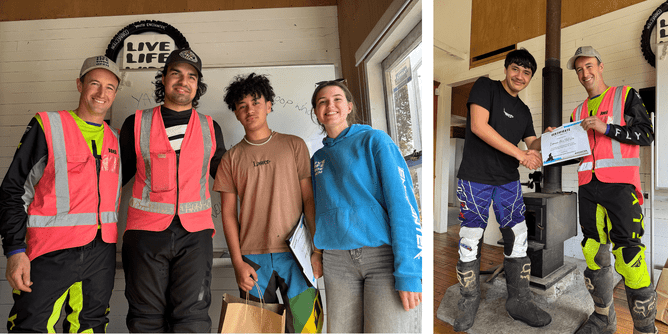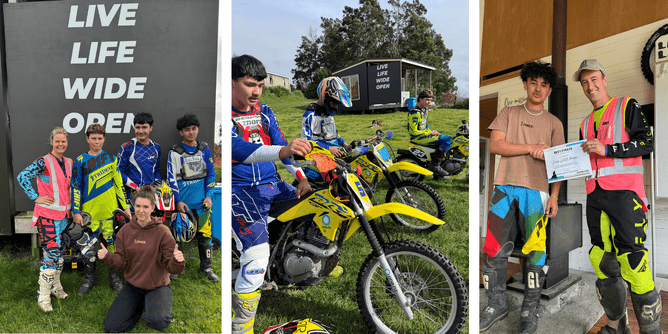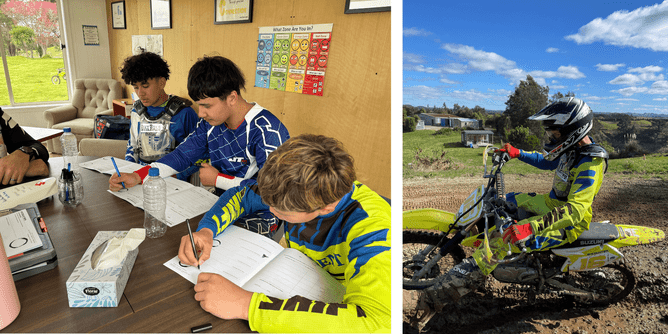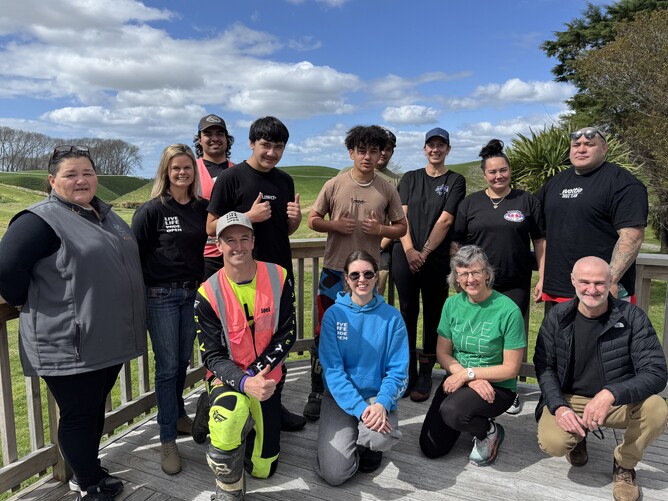The Impact of Long-term Partnerships
Every young person longs for a future where they belong, where they feel capable, and where they know their life has purpose. Yet for many rangatahi in Whakatāne and across the Eastern Bay of Plenty, anxiety, grief, disconnection, or barriers in mainstream education can cloud that future.
Since 2016, Youth Encounter and EastBay REAP Āpiti Hou have partnered together to change that story. Each year, groups of young people step onto the Live Life Wide Open track through our Youth Encounter Dirt Bike Group Therapy programme. They arrive carrying heavy challenges, often uncertain of themselves and their future. But as the weeks unfold, they discover something new: courage, confidence, and the ability to choose a different line in life.
Mainstream education doesn’t work for everyone. Some of these young people struggle with attendance, self-belief, or carrying the weight of trauma. Others battle with anger, anxiety, or a lack of positive role models. Without the right support, their pathway can quickly slide toward disengagement and missed opportunity.
At Youth Encounter, we don’t see these people as “problems to be fixed.” We see them as rangatahi with untapped potential. Through our therapeutic activity-based programmes, we provide a safe place to belong, skilled mentors, and experiences that stretch them in new ways.
As one of the past Āpiti Hou tutors, Matua Derek, put it:
“This place boosts kids’ self-confidence. Without this engagement, we would not have seen the transformation that is so evident today.”
The dirt bike track becomes more than a place to ride. It becomes a place where life lessons are embodied: choosing the right line, getting up after a fall, and encouraging others on the journey.
The Dirt Bike Group Therapy programme runs for eight weeks, meeting once per week. Students are carefully selected by Āpiti Hou based on attendance, attitude, and engagement in learning. Together with their tutors and whānau, they commit to the kaupapa.
Over the course, young people:
Learn new skills — riding, balance, and bike control.
Reflect on values — connecting lessons from the track to life choices.
Build resilience — developing the confidence to try, fail, and try again.
Transfer learning — carrying those lessons back into school, whānau, and future pathways.
The outcomes are tangible. More than 90% of participants re-engage in mainstream school, further education, or employment after completing the programme.
One young man referred by EastBay REAP’s first cohort is living proof of this transformation. When he first arrived at Youth Encounter, this young man carried the weight of immense hardship. Having faced deep trauma, family breakdown, and significant mental health challenges, he struggled with belonging, confidence, and engagement in education. Life had dealt him layers of grief, disconnection, and instability, leaving him isolated and at risk. It was one of the most high-needs referrals our programme had received.
Over time, through group therapy, mentoring, counselling, and opportunities to take part in camps and events, he began to rebuild confidence and discover his strengths. Step by step, he grew in leadership, communication, teamwork, and resilience. He even gained his driver’s licence and is now studying full-time in tertiary education with a vision to become an engineer. Today, he not only stands on his own path forward but also gives back by encouraging other young people — a powerful turnaround for what was one of the most high-needs referrals our programme had received.
His journey is not unique. Year after year, Āpiti Hou rangatahi tell us similar stories:
“You’ve helped me change paths and follow the right lines instead of making the wrong decisions.” – Te Wahira
“Thank you for having such a big heart for me and the other youth you’ve taught.” – Ngarongo
“Dirt Bike Therapy helped me with my confidence.” – Anthony
Educators echo the same:
“All our kids from last year are either employed or on courses. I can see the girls [current group] here doing the same. It is exciting to see.” – Pauline Craven, past Principal of Āpiti Hou
Without opportunities like this, many rangatahi risk remaining stuck—trapped in cycles of low self-worth, truancy, and limited prospects. But with the right intervention, they build resilience, discover their strengths, and create new futures.
As one caregiver reflected:
“She used to never come out of her room. Now her confidence has just skyrocketed. It’s incredible to see.”
This partnership has created a ripple of transformation across the Eastern Bay of Plenty. We’ve seen:
Fewer school absences and stronger engagement in learning
Greater respect for others and improved relationships with whānau and teachers
Increased confidence, resilience, and willingness to take on new challenges
Pathways into employment, driver licensing, and further education
And our outcomes data at Youth Encounter from the past 8 years strengthens this picture:
89% of participants report increased self-worth, confidence, and secure identity.
84% report greater motivation and aspirations, with a forward-focused mindset for growth.
What began as a small pilot in 2016 has now become a trusted collaboration that changes lives every year.
This is more than riding dirt bikes. It’s about unleashing potential, building resilience, and giving young people the tools to believe:
“I have what it takes. I am not alone. My future is mine to create.” – participant
Together, Youth Encounter and EastBay REAP Āpiti Hou are proving that when community stands alongside rangatahi, the track ahead is wide open.
Term 3 Group Therapy with Āpiti Hou
During Term 3, 2025, Youth Encounter had the pleasure of delivering our Group Therapy programme to a group of five rangatahi referred to us on behalf of Āpiti Hou. These young people, aged 13 to 14, that we engaged with were identified as having a range of the following risk factors: abuse and neglect, criminal activity, educational disengagement, family conflict or breakdown, family criminal history, financial hardship, gang affiliation or influence, self-harm or suicidal behaviours, and trauma.
Throughout the programme, three youth facilitators – two activity staff and one counsellor – journeyed alongside the group, offering consistent guidance and support to meet each young person’s individual needs. Our kaupapa at Youth Encounter is grounded in the Te Whare Tapa Whā model of wellness, which recognises the importance of nurturing all areas of well-being – taha tinana (physical wellbeing), taha hinengaro (mental and emotional wellbeing), taha whanau (family and social wellbeing), and taha wairua (spiritual wellbeing).
As facilitators, we were encouraged by the growth and engagement we saw develop over the course of the programme. While participation levels varied at the beginning, it was rewarding to see each young person gradually begin to open up and find their place within the group. Over time, we witnessed genuine moments of connection, reflection, and courage as the rangatahi started to engage more meaningfully with the activities and discussions.
In our first session together, the group worked collaboratively to establish their own shared values — respect, responsibility, self-control, reliability, and honesty. Rather than setting strict rules, this process gave the young people ownership and encouraged them to think about the kind of group culture they wanted to create. These values became touchstones that helped guide our time together and reminded everyone of the importance of respect and integrity in their interactions.
Through consistent encouragement and unconditional positive regard from facilitators, we began to see shifts in how the rangatahi related to each other—more openness, mutual respect, and confidence to share when they felt ready.
Story of Transformation:
When Wiremu first joined the Youth Encounter programme, he was quiet and kept close to his mate. You could tell he wasn’t quite sure about the whole thing yet. He’d hang back and stay on the edges of group chats. He seemed to be lacking the confidence to express his thoughts and fully invest in our time together.
As the weeks went on and his friend transitioned back into mainstream school, we noticed a shift. Wiremu began to open up to the rest of the group, forming new friendships and finding his own place among the team. Slowly, we started to see his personality shine through—his happiness, his kindness, and his deep way of thinking about things.
In our therapy discussions, he began to speak up, sharing raw and real insights, showing how much he was reflecting on life, his choices, and the person he wanted to become. At the same time, he started showing real drive to get back into school. Each week, he’d check in with his tutors, asking how close he was to returning to mainstream. You could see a spark of motivation growing within him.
By the time we reached our final celebration, the change in Wiremu was clear to everyone—especially his whānau. As families gathered to celebrate the group’s journey, Wiremu stood up, completely on his own, and gave a speech thanking Youth Encounter. It wasn’t something anyone had asked him to do; it came straight from the heart. His whānau were blown away, surprised and proud to see him stand tall, speak clearly, and show so much courage in front of everyone.
Wiremu’s transformation was beautiful to watch. He found his voice, his confidence, and a sense of belonging that gave him new energy for life. He discovered that courage isn’t about being fearless—it’s about showing up, trying again, and letting people see who you really are. By the end of the programme, Wiremu wasn’t just participating—he was thriving. He truly found what it means to Live Life Wide Open.



